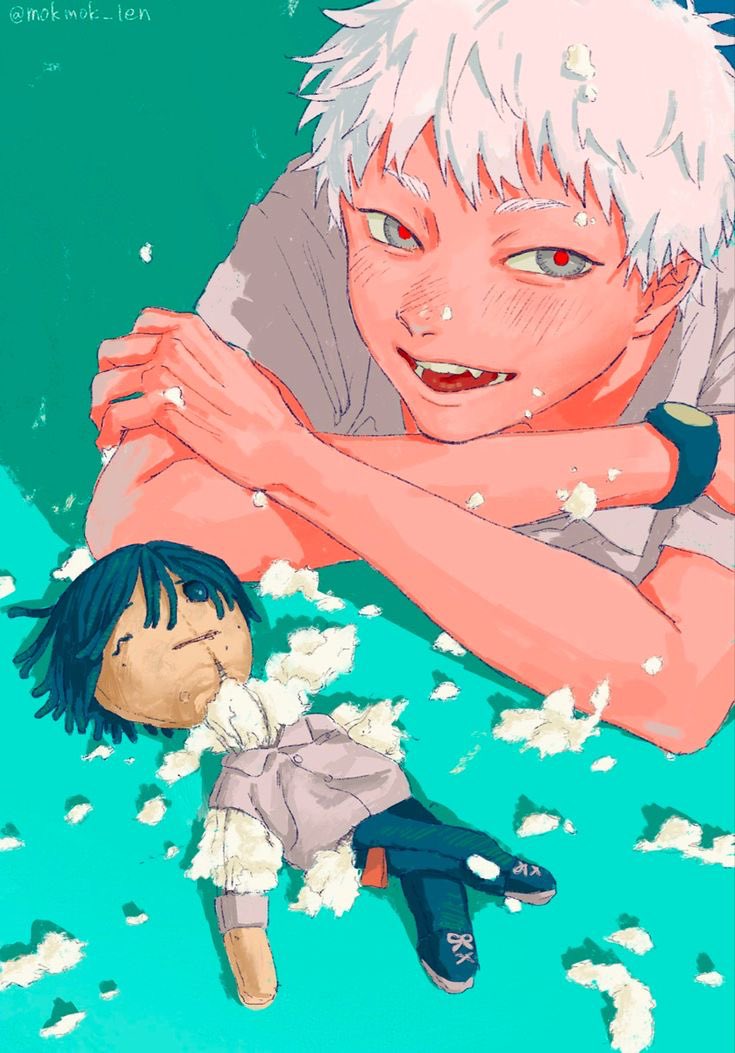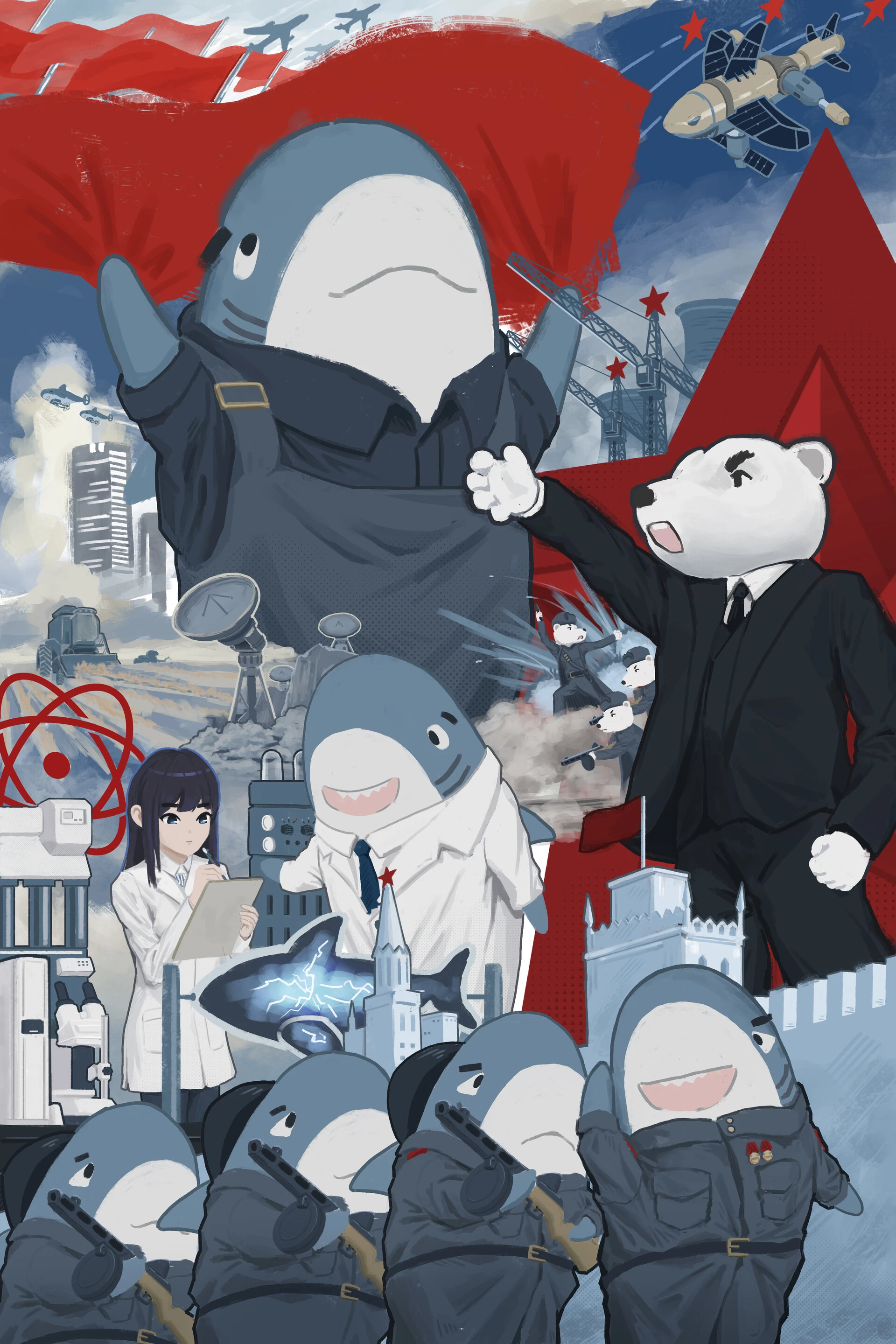Here's to a new year! Here's my first mega try (also first time posting in a while due to reasons) but heya! Admittedly struggled a fair bit with self doubt and anxiety on this one as put it off for a while/other things caught up with me but I figure I'll be glad I did it once I've done it. It's kinda being done last minute though, so admittedly there's that...
I'd been intending to make the mega about something else originally when I signed up, but that would require more time on my part (and I just binge read this recently, so it all works out). Anyways, my subject of the week is The Summer Hikaru Died; it's a queer (BL) horror manga which is currently also scheduled for anime release next year (2025).
Content warnings naturally follow and further details will be spoilered.
CONTENT WARNINGS
Grief, body horror and (very debatably IMO) mild gore, supernatural horror (ghosts/"impurities", otherworldly entities), death I suppose though that one's a given
Premise
The titular Hikaru went for a walk in the woods, died, and something came back wearing his body, something that doesn't quite know how to be human or mortal; "Hikaru" returned, to ensure that his best friend, Yoshiki, would not be lonely. Romantic tension (and tension of a less pleasant kind) ensues.
The plot/things I like about it thus far (light spoilers)
Yoshiki and "Hikaru" have an absolutely great dynamic- their relationship may not be fully healthy, but their intentions seem to both be in the right place, as are their deep feelings (Yoshiki's for Hikaru and increasingly for "Hikaru," and Hikaru and "Hikaru's" own true feelings) and honesty in this regard, despite the latter "Hikaru" being effectively an imposter of sorts. (it's complicated, but these are increasingly distinguished separately and I really like that process as well)
"Hikaru" is, while not quite a blank slate, extremely new to the concept of even just "being" in the sense that mortal creatures and individual organisms(?) do. They've had to learn (and Yoshiki has had to confront them about) the value and significance of life and death; they've increasingly established boundaries, and they approach the world with a liveliness and curiousity that is really cute (the original Hikaru was also lively FWIW, but "Hikaru" is experiencing everything anew even if they retain the memories).
Yoshiki, on the other hand, is both grappling with his grief and loss of Hikaru, while finding comfort (and discomfort alike) in his imposter, and in guiding them through a new world or state of being. He's finding his resolve and moral/ethical backbone interacting with "Hikaru" (very blue-and-orange morality dynamics, though they're learning), he's experiencing what could be described as a rocky but determined romance and queer experimentation at the same time "Hikaru" is being introduced to notions of attraction and desire (beyond instinctual desire to consume).
Their pairing in so many ways should not work (or rather would be usually destined for a tragic end). From the start, there have been several points where by all means it should have met such an end. But their determination and willingness to meet the other where they're at and gradually be understanding with the other is both fascinating and something I'd feel optimistic for (and interested in seeing play out further).
Anyways, I should cut myself short at this (and make sure to have something properly written beforehand for next time). But anyways, thus far it's a strong recommend (if you feel alright with the content warnings) from me.
Join our public Matrix server! https://matrix.to/#/#tracha:chapo.chat
As a reminder, please do not discuss current struggle sessions in the mega. We want this to be a little oasis for all of us and the best way to do that is not to feed into existing conflict on the site.
Also, be sure to properly give content warnings and put sensitive subjects behind proper spoiler tags. It's for the mental health of not just your comrades, but yourself as well.
Here is a screenshot of where to find the spoiler button.



On Nihilism
For all the nihilism haters and lovers (and people who don’t know much about it): here’s my nuanced take as someone who’s grappled with it too much.Knowledge is possible. It is difficult to have solid conceptual understandings of reality because language is a conditioned social phenomenon that imprecisely attempts to reflect a reality that is always moving. Yet we know reality by experiencing it. Though memories may change we truly know this real experiential moment and form useful assumptions as to what to do within it. We can form those assumptions socially, expanding beyond what we know from our own experience.
Human values are not a science. Reality is infinitely complex and there are infinite perspectives on it, so we cannot find context-independent maxims for how people should act. Still, we know generally that all beings seek to avoid pain and seek pleasure. Yes it doesn’t matter because we will all die and pleasure is fleeting, but generally it feels nice to help ourselves and others feel better. There are skillful and unskillful ways to do so, and we are alive now so we might is well do what we can to make life more tolerable to the best of our abilities.
Beyond morals, what is “the point” of this life? That is an inherently flawed question because nature has no teleology. Chuds will take this and say they need to have as many kids as possible. It is an odd linguistic conception thought to follow from the cultural belief that all should be done for god. But god is dead, right?
Purposes can be more or less grand but they are generally socially imposed and offered. There are ideas about perfect lifestyles and families, secular and religious that people strive for. They may not question it, but most are oriented to certain social and personal goals and values. These have the power to enhance one’s life or increase one’s suffering.
A Christian may be a happy saint, led by their morals to help people. They could be miserable constantly worrying about going to hell. They could do horrible things in the name of their values. Someone may take joy in their care for body, or may be constantly fearful that they are not doing enough. Generally it feels better to run toward good things than away from bad ones.
There are also philosophical answers that can be comforting in how to live one’s “meaningless” life. Living it to the fullest and embracing suffering as if you will live the same life repeatedly forever (Nietzsche). Finding wonder in how odd things are and choosing your own goals to arbitrarily follow in spite (Camus). Surrendering occasionally to the infinite in acceptance of your own limits in a true (not superficial) religious fashion (Nishitani). There are also of course literary perspectives.
Most people who “succumb to nihilism” in the west default to either embracing misery and a lack of agency or simple hedonism. The former is not fun and not necessarily implied by nihilism. You will die anyway whether you live your life to the fullest or not. Thus you are free. Capitalist consumer society tends to ingrain in people the underlying assumption that pleasing oneself is the greatest good and the value system of satisfying immediate urges is all that is left when we realize all else is meaningless. Although, there is an inherent tendency to try to become satisfied in all humans, self-gratification meets its end in the hedonic treadmill and is ultimately rather unskillful. We can skillfully go about seeking ease, including with the use of semi-arbitrary value systems.
It is my opinion that nihilism - dwelling in the lack of objective certainty in many things taken for granted - has great destructive as well as constructive possibilities. Many do not have the chance to assess things in this way, and one going through it can learn a lot from it and come out a greater understanding of the limitations of their experience and knowledge, and a thoughtful path forward in considering what one values. Just like how facing death can help one appreciate life.
Nihilism is not something that must obliterated in whatever fashion. It’s an emotion that can be processed well or not.
We lefties generally say believe what you will but we have a project of preserving and enhancing human and non-human life in a certain non-hierarchical way that intends to relieve material suffering and give access to greater, not alienated but purposeful, joy and satisfaction. Going through phases of nihilism can enhance our ability to understand our relationships to each other and to truth that can allow us to organize collectively to achieve our aims.
spoiler
@Wendy_Pleakley@hexbear.net @Thallo@hexbear.net @Yukiko@hexbear.net @imogen_underscore@hexbear.net whatcha think